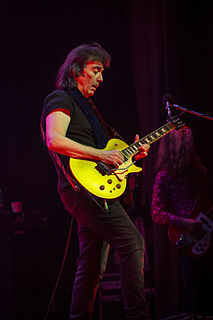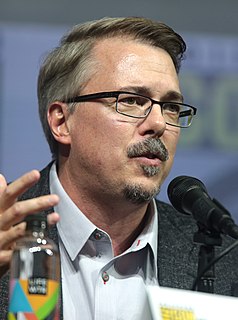Top 252 Remotely Quotes & Sayings - Page 5
Explore popular Remotely quotes.
Last updated on April 15, 2025.
I hear all the time that 'unemployment is greatly reduced, but the people aren't feeling it.' When the media, talking heads, the White House and Wall Street start reporting the truth - the percent of Americans in good jobs; jobs that are full time and real - then we will quit wondering why Americans aren't 'feeling' something that doesn't remotely reflect the reality in their lives. And we will also quit wondering what hollowed out the middle class.
I think computers have changed things tremendously. At one time, you tended to take the rough with the smooth. But now, because you can go back and stop and start, and have a limitless amount of tracks if anything looks remotely good, we keep it. You've got to go through the agony of sounding very human at first, and then you work on it with the aid of technology. Computers have revolutionized things in many ways allowing me to work to a standard I could have only joked about fourty years ago.
It is best to lay our plans widely in youth, for then land is cheap, and it is but too easy to contract our views afterward. Youths so laid out, with broad avenues and parks, that they may make handsome and liberal old men! Show me a youth whose mind is like some Washington city of magnificent distances, prepared for the most remotely successful and glorious life after all, when those spaces shall be built over and the idea of the founder be realized. I trust that every New England boy will begin by laying out a Keene Street through his head, eight rods wide.
To be recognized for your hard work is a true honor. An Academy Award nomination is one thing that, five years later, I can't form a sentence about. It has not made me feel like I can work any less hard. It makes me feel like I have to work 100 times as hard, to even be as remotely good, to work through an experience that could take me through that again.
There has never been a military operation remotely approaching the scale and the complexity of D-Day. It involved 176,000 troops, more than 12,000 airplanes, almost 10,000 ships, boats, landing craft, frigates, sloops, and other special combat vessels--all involved in a surprise attack on the heavily fortified north coast of France, to secure a beachhead in the heart of enemy-held territory so that the march to Germany and victory could begin. It was daring, risky, confusing, bloody, and ultimately glorious [p.25]
Television is a great job for a writer in the way that movies used to be, way before my time. Back when writers in Hollywood were on staff or under contract at any given studio and you'd write movie scripts and then the movies would get made within a few weeks, such that you could be a working writer in the movie business back in the '30s and '40s and '50s and have a hand in writing five or six movies a year that actually got produced. The only thing remotely like that in the 21st century here in Hollywood is working in the TV business.
She couldn't think of anyone else who remotely resembled him. He was complicated, almost contradictory in so many ways, yet simple, a strangely erotic combination. On the surface he was a country boy, home from war, and he probably saw himself in those terms. Yet there was so much more to him. Perhaps it was the poetry that made him different, or perhaps it was the values his father had instilled in him, growing up. Either way, he seemed to savor life more fully than others appeared to, and that was what had first attracted her to him.
From quite early on, I had this idea of compartmentalized identities - 'this is how you are when you are with your mum, and this is how you are when you are with your dad' - so it seemed like I could never absolutely be myself. And the image of myself as compromised and inconsistent made me want to withdraw from the world even further. I had a sense of formulating a paper-mache version of myself to send out in the world, while I sat controlling it remotely from some smug suburban barracks.
Maybe that's what growing up means, in the end - you go far enough in the direction of - somewhere - and you realise that you've neutered the capacity of the term home to mean anything. [...] We don't get an endless number of orbits away from the place where meaning first arises, that treasure-house of first experiences. What we learn, instead, is that our adventures secure us in our isolation. Experience revokes our licence to return to simpler times. Sooner or later, there's no place remotely like home.
In Rome, I really wanted an Audrey Hepburn Roman Holiday experience, but the Trevi Fountain was crowded, there was a McDonald's at the base of the Spanish Steps, and the ruins smelled like cat pee because of all the strays. The same thing happened in Prague, where I'd been yearning for some of the bohemianism of The Unbearable Lightness of Being. But no, there were no fabulous artists, no guys who looked remotely like a young Daniel Day-Lewis. I saw this one mysterious-looking guy reading Sartre in a cafe, but then his cell phone rang and he started talking in aloud Texan twang.
Our "society" is not a community, but merely a collection of isolated family units. Desperately insecure, fearing his woman will leave him if she's exposed to other men or to anything remotely resembling life, the male seeks to isolate her from other men and from what little civilization there is, so he moves her out to the suburbs, a collection of self-absorbed couples and their kids. Isolation, further, enables him to try to maintain his pretense of being an individual by being a "rugged individualist", a loner, equating non-co-operation and solitariness with individuality.
Right up till the 1980s, SF envisioned giant mainframe computers that ran everything remotely, that ingested huge amounts of information and regurgitated it in startling ways, and that behaved (or were programmed to behave) very much like human beings... Now we have 14-year-olds with more computing power on their desktops than existed in the entire world in 1960. But computers in fiction are still behaving in much the same way as they did in the Sixties. That's because in fiction [artificial intelligence] has to follow the laws of dramatic logic, just like human characters.











